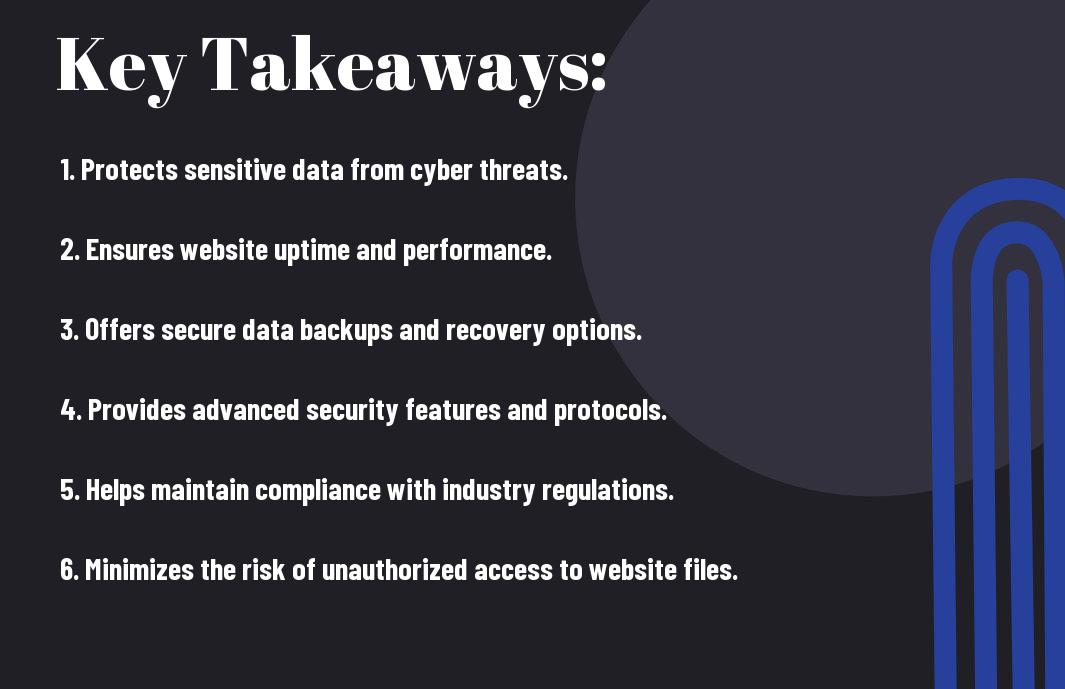Ensuring the security of your website is paramount in today’s digital landscape. When it comes to hosting your website, selecting a secure hosting service provider is crucial for the safety of your data, your customers’ information, and the reputation of your business. A breach in security can lead to devastating consequences such as lost revenue, damaged customer trust, and legal implications. That’s why it’s imperative to choose a hosting service that prioritizes security and offers robust protective measures against potential threats. Inturact’s blog article, “10 REASONS Why Web Hosting matters for Your E-commerce Business“, outlines how the right hosting service can make all the difference in the success and safety of your online business.
Understanding Hosting Security Threats
Before delving into the importance of a secure hosting service provider, you need to understand the various security threats that can compromise the integrity of your website. It’s essential to be aware of the potential risks and vulnerabilities that could impact your online presence. To gain deeper insights into the topic, you can refer to the comprehensive guide on Web Hosting Security: 10 Things to Look For in Your Provider.
Types of Security Threats to Hosting Services
When it comes to hosting security, there are several threats that you should be concerned about. These include malware infections, data breaches, DDoS attacks, SQL injection, and cross-site scripting. Each of these threats can have severe repercussions for your website and business, compromising the confidentiality, integrity, and availability of your data. Perceiving the distinct characteristics of these threats is crucial in implementing appropriate security measures to mitigate the risk.
| Threat Type | Description |
|---|---|
| Malware Infections | Malicious software designed to disrupt, damage, or gain unauthorized access to computer systems. |
| Data Breaches | Unauthorized access to sensitive information, resulting in exposure or theft of data. |
| DDoS Attacks | Deliberate attempt to overwhelm a website or server with traffic, causing it to become slow or unresponsive. |
| SQL Injection | Injection of malicious SQL code into input fields, exploiting vulnerabilities in web applications and databases. |
| Cross-Site Scripting | Injection of malicious scripts into web pages viewed by other users, leading to unauthorized actions on their behalf. |
Impact of Security Breaches on Businesses
As a business owner, security breaches can have devastating repercussions for your organization. They can tarnish your reputation, lead to financial losses, and result in legal implications. A breach can erode customer trust and confidence, leading to a decline in your business’s success. Additionally, it can disrupt your operations, impacting productivity and revenue. The aftermath of a security breach can be detrimental, affecting the long-term sustainability of your business.
Key Features of a Secure Hosting Service Provider
Obviously, when selecting a secure hosting service provider, it is essential to consider the key features that contribute to the overall security of your website. Here are some of the most important features to look for:
- Robust infrastructure and network security to prevent unauthorized access and protect against various cyber threats
- Data protection and backup strategies to ensure the safety and integrity of your valuable data
- Regular security updates and patches to address vulnerabilities and enhance protection
- 24/7 monitoring and support to promptly address any security incidents or concerns
- Strong encryption and secure transmission protocols to safeguard data in transit
Recognizing the importance of these key features can help you make an informed decision when choosing a secure hosting service provider. For more information on this topic, you can read the article on The Importance of Website Hosting & Server Security.
Robust Infrastructure and Network Security
When it comes to your website’s security, the infrastructure and network security of your hosting service provider play a crucial role. A robust infrastructure and network security ensure that your website is protected from various cyber threats, unauthorized access, and other potential security vulnerabilities. This includes the use of firewalls, intrusion detection systems, and other security measures to safeguard your website and its data from malicious actors.
Data Protection and Backup Strategies
Another important aspect of a secure hosting service provider is the data protection and backup strategies they have in place. Your website’s data is one of its most valuable assets, and it is essential to have measures in place to protect and recover it in case of any unforeseen events. Look for a service provider that offers reliable data backup solutions, data encryption, and other data protection measures to ensure the safety and integrity of your data.

Choosing the Right Secure Hosting Service Provider
Your choice of a secure hosting service provider is critical to the safety and reliability of your website. With the increasing number of cyber threats, it is essential to partner with a hosting provider that prioritizes security. Here are some key factors to consider when making this important decision.
Industry Compliance and Certifications
When choosing a secure hosting service provider, you need to ensure they are compliant with industry standards and possess relevant certifications. Look for providers that adhere to industry-specific regulations, such as HIPAA for healthcare or PCI DSS for e-commerce. Additionally, certifications like ISO 27001 demonstrate a commitment to established security protocols and best practices. By selecting a provider with these qualifications, you can rest assured that your data will be handled with the utmost care and security.
Evaluating Provider Security Measures and Reputation
Before finalizing your decision, thoroughly evaluate the security measures and reputation of potential hosting service providers. Consider factors such as data encryption, firewalls, intrusion detection systems, and other security features they offer. Look for a provider with a proven track record of protecting against cyber threats and a reputation for maintaining high-level security. Check for any history of security breaches or incidents and consider reading reviews and testimonials from other clients to gauge their level of satisfaction with the provider’s security measures.
Best Practices for Maintaining Hosting Security
Despite having a secure hosting service provider, it is crucial to implement best practices for maintaining hosting security. These practices can help you further enhance the protection of your website and sensitive data from potential threats and vulnerabilities. By following these best practices, you can significantly reduce the risk of security breaches and ensure the continued safety of your online presence.
Regular Updates and Maintenance
Regular updates and maintenance of your hosting environment are essential for ensuring the security of your website. This includes keeping your operating system, server software, and applications up to date with the latest security patches and updates. Failure to perform regular updates and maintenance leaves your hosting environment vulnerable to potential exploits and security threats. By staying on top of updates, you can minimize the risk of security vulnerabilities and ensure the ongoing protection of your website and data.
User Education and Access Control Policies
User education and access control policies are crucial components of maintaining hosting security. Educating your team members and implementing access control policies can help prevent unauthorized access to your hosting environment and sensitive data. By enforcing strong password policies, implementing multi-factor authentication, and regularly updating user access permissions, you can mitigate the risk of unauthorized access and potential security breaches. Additionally, providing ongoing security training and awareness programs for your team members can help strengthen their understanding of security best practices and the importance of safeguarding sensitive data.

The Importance of a Secure Hosting Service Provider
Drawing together all the information and insights provided, it is clear that a secure hosting service provider is crucial for the protection of your website and the sensitive data it may hold. By choosing a reputable hosting service, you can ensure that your website is protected from potential cyber attacks, data breaches, and other security threats. It also gives you peace of mind, knowing that your customers’ information is safe and secure. Investing in a secure hosting service provider is not only a smart decision, but it is also necessary to maintain the integrity and reputation of your online presence.
CATEGORY:Uncategorized

